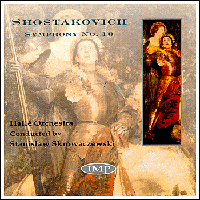
SHOSTAKOVICH
Symphony No. 10 in E minor, Opus 93 (1953)
Hallé Orchestra cond. Stanislaw Skrowaczewski
IMP Classics PCD 2043
[51:37/DDD]

SHOSTAKOVICH
Symphony No. 10 in E minor, Opus 93 (1953)
Hallé Orchestra cond. Stanislaw Skrowaczewski
IMP Classics PCD 2043
[51:37/DDD]
Anyone on a tight budget building a basic Shostakovich collection in digital sound should try this "super-bargain" reissue of a disc first released in 1991. Apart from Mravinsky [Saga EC3366-2, rec. 1954, mono], there's nothing to touch it in this cheapest of price brackets. In fact, this performance is arguably more convincing than any current full-price offering. In its general range, only Karajan's 1966 version on Deutsche Grammophon [429716-2] competes, but this mid-price reissue is more expensive and its CD transfer is unsatisfactory.
Skrowaczewski, the Hallé's principle guest conductor before the arrival of Kent Nagano, was a Polish-born musician who, having conducted the Warsaw National Philharmonic in the late 1950s, made his Western reputation with the Minnesota (Minneapolis) Orchestra during 1960-79. (See various reissued Mercury recordings of the 1960s.) He began his career as a pianist before his hands were damaged during an air-raid in wartime Lvov. Having studied under Nadia Boulanger in Paris after the war, he went on to become a prize-winning composer of, among other works, four symphonies. But it was as a conductor that Skrowaczewski found his true vocation, particularly with the Hallé, with whom he recorded a fêted Brahms symphony cycle as well as outstanding versions of the Fourth symphonies of Bruckner and Mahler. (The conductor's Shostakovich Fifth [PCD 2018] is, alas, not as commendable as his Tenth.)
Skrowaczewski's conception of Shostakovich's Tenth is fiery and propulsive. Only Mravinsky's definitive (but "historical") première recording compares in this respect, the similarly full-tilt version by Christoph von Dohnanyi with the Cleveland Orchestra (Decca) disqualifying itself by its over-heated rhetoric. Paying close attention to markings and stressing dissonances which other conductors lose in the overall texture, Skrowaczewski is a minute or two faster than Karajan in the opening movement, but this only shows in its coda, which lacks a measure of repose. His scherzo is fast and savage, but also unusually clear. In the Allegretto, he is the only conductor to attempt a radical accelerando in the penultimate passage, whipping the orchestra into a hysterical crescendo which strains ensemble but nonetheless memorably makes its point. The finale is one of the best on disc. IMP's production is both wide-ranging and realistic.